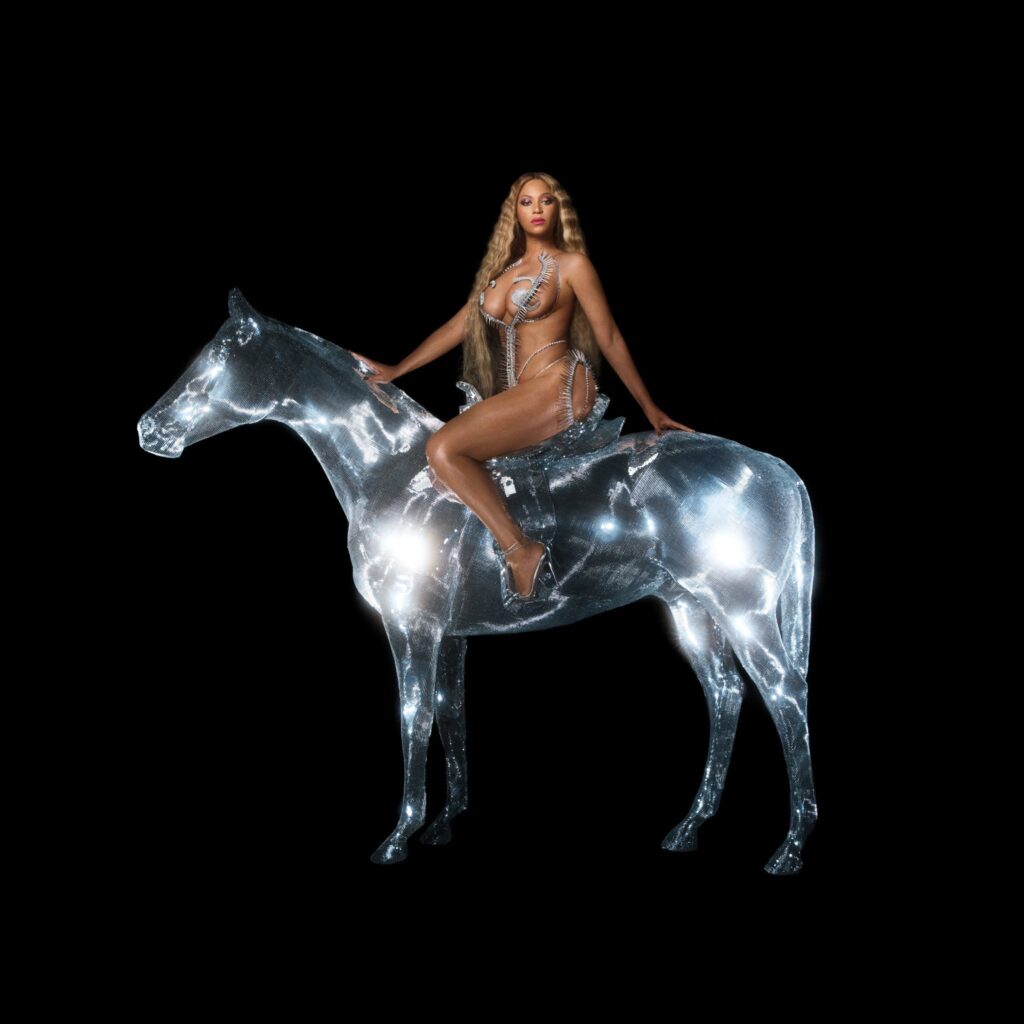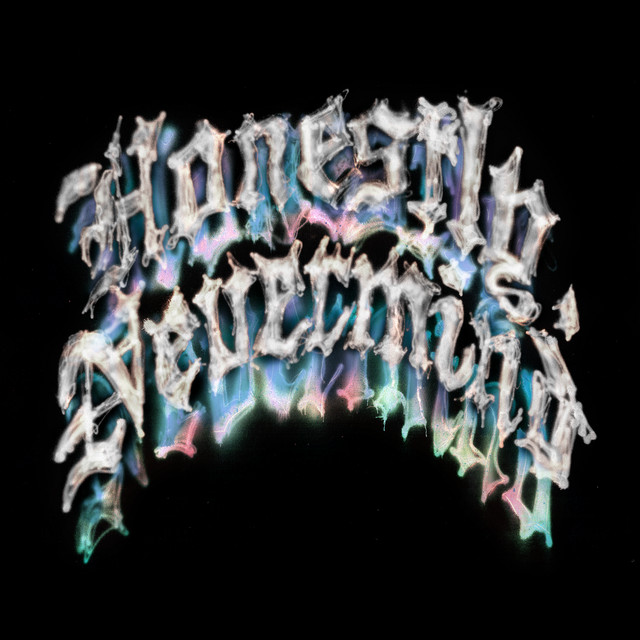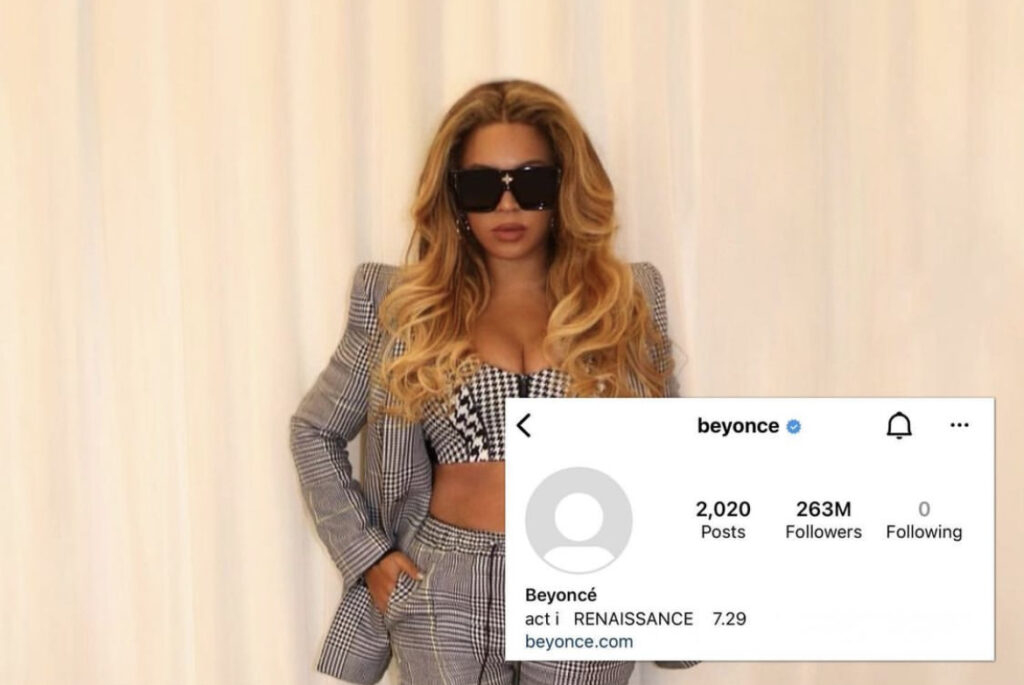30 Jun Beyoncé Says ‘Renaissance’ Allowed Her to “Feel Free”
 In a new Instagram post, Beyoncé revealed the artwork for Renaissance and gave us some insight into the creation of the album, explaining that it allowed her to dream and feel free.
In a new Instagram post, Beyoncé revealed the artwork for Renaissance and gave us some insight into the creation of the album, explaining that it allowed her to dream and feel free.
 In a new Instagram post, Beyoncé revealed the artwork for Renaissance and gave us some insight into the creation of the album, explaining that it allowed her to dream and feel free.
In a new Instagram post, Beyoncé revealed the artwork for Renaissance and gave us some insight into the creation of the album, explaining that it allowed her to dream and feel free.
In popular music, there are a some songs that just stick. And we’re not talking about the ones with specific holiday or holiday-adjacent themes. We’re talking about the songs that just become part of our lives for no particular reason.
Cameo’s 1986 hit, “Candy,” is one of such hits.
Released as the second single from their 12th album, Word Up!, “Candy” only managed to reach No. 21 on the Billboard Hot 100. However, following the release of the movie The Best Man (which became an instant classic), the song’s place in history would be forever changed.
In the closing scene of the movie, the wedding party does the Electric Slide. However, they’re not doing it to Marcia Griffiths’ “Electric” — the song for which the dance was created. They’re doing it to Candy’s “Cameo.”
Following the success of that movie, wedding parties — and parties in general — all across America started doing the same. And almost a quarter-century later, this is now standard practice. Gen Z probably doesn’t associate any other song with the Electric Slide.
In addition to becoming the new Electric Slide song, “Candy” has also become a signifier that a party is over or almost over, and we also have The Best Man to thank for that. The song plays as the credits roll.
As interesting as its trajectory from forgotten hit to party staple may be, that’s not the most fascinating thing about “Candy.” The most fascinating thing about that song is that it probably has nothing to do with what you might think. Of course, we know it’s not about candy, but if you’re like me, you assumed it was about sex. However, according to a fairly popular theory, the song is about drugs. Cocaine, to be exact.
I’ll give you a moment to pick your jaw up from the floor.
“Giving me a heart attack, it’s the kind I like” feels even less wholesome when you learn about this new possible meaning. Don’t we love songwriters?
Another interesting footnote in the history of “Candy” is that it was sampled on Mariah Carey’s “Loverboy” after the initial sample for the song was used by Jennifer Lopez — at the suggestion of Tommy Mottola, Mariah’s ex-husband and biggest hater.
“Candy” is yet another example that shows that initial chart success isn’t always the best predictor of a song’s legacy.
In case you missed it, Drake’s new album came with a video for “Falling Back.”
“Down Hill” was right there, but what do I know?
The video has Champagne Papi in fuckboy form, saying “I do” to 23 women while his best man — none other than fellow Canadian and real-life fuckboy Tristan Thompson — beams with pride. Check it out below.
“Break My Soul,” the lead single for Beyoncé’s highly anticipated seventh studio album, Renaissance, came about two hours early and the kids are losing it.
It’s me. I’m the kids.
After years of largely depriving us of truly danceable music, Bey has given us the banger we deserve. Based on samples of Robin S.’s early ’90s classic, “Show Me Love,” and Big Freedia’s “Explode,” “Break My Soul” is a House track with the kind of R&B feeling that cannot be avoided on a Beyoncé song. It feels like a song written specially for millennials — a.k.a. the burnout generation — but after the last few years we’ve had, its lyrics will speak to the hearts of the masses. The hook feels like a battle cry for the overworked, and Big Freedia’s chanting throughout the song makes you want to drop every single thing that’s stressing you out — your job, your shitty friends, you name it.
British Vogue editor-in-chief Edward Enninful had described Renaissance as music that takes him “back to the clubs of [his] youth.” Many thought that meant it was a disco album, but given that he was born in ’72, a dance album always seemed more likely. With “Break My Soul,” we now know what time it is. And we are pleased.
The song was written by BlaqNmilD, Jay-Z, Tricky Stewart, The-Dream and Beyoncé (and produced by the latter three). All songwriters of the sampled tracks — Big Freedia for “Explode,” Fred McFarlane and Allen George for “Show Me Love” — are also credited on “Break My Soul.” As previously reported, Renaissance arrives on July 29.
 Nine months after the release of Certified Lover Boy — an album that featured pregnant woman emojis in its artwork — Drake is back with another album. Because Aubrey Graham is a comedian at heart.
Nine months after the release of Certified Lover Boy — an album that featured pregnant woman emojis in its artwork — Drake is back with another album. Because Aubrey Graham is a comedian at heart.
Honestly, Nevermind — officially his seventh studio album — was executive-produced by the rapper/singer himself along with usual suspects Noah “40” Shebib and Oliver El-Khatib. And a fourth executive producer: South African DJ Black Coffee. Before the album arrived, fans pointed this out as evidence that it would have some House influences. Let’s find out, shall we?
The album opens with a jazzy intro, and then without warning, we’re thrown into the second track, “Falling Back,” a synth-driven track underpinned with a pulsing beat. Drake sings about a failing relationship on the track, which bears similarities feel to 2017’s “Passion Fruit.” It is a strong opener that could’ve been stronger if it was shortened by a minute or so.
“Falling Back” is followed by “Texts Go Green,” another synth-y, sung track. Much like its predecessor, Drake laments about a soured relationship, but this time, he’s handing a pink slip and running down a list of all the things his ex-lover did wrong. “You’re dealing with me rough,” he sings, over the dancehall-ish beat. The song’s title is sure to be a favorite among iPhone users.
We hear more about troubled relationships on “Currents,” which has a squeaking bed sound on loop throughout the track. My ear tells me that it samples House classic “Coffee Pot (It’s Time for the Percolator),” but the credits don’t mention it, so Green Velvet may or may not have a bag to collect in the near future.
“I found a new muse, that’s bad news for you. Why would I keep you around?” We’ve had lots of caption-able lyrics so far, but “A Keeper” — another House track — brings them by the boatload.
“Calling My Name” is a two-minute song that comes in two drastically different halves. I vote for the latter (more danceable) half, where Drake sings, “Your pussy is calling my name, so come on, baby, let’s stop playing games.” This is clearly one for the fuckboys. Also, by the time we get to the end of this track, it becomes abundantly clear: Honestly, Nevermind is a House album.
On “Sticky,” we finally get to hear Drake rap. On this track, Drake talks about his mom wanting him to have a regular degular corporate career and how he became a CEO anyway despite going a different route. He also speaks a little French, calls for the release of Young Thug, and lets us know why he has never attended the Met Gala: “They only giving niggas plus-ones,” he raps, adding that has to “bring the set.” Production-wise, “Sticky” is the most “hip-hop” track so far, but it definitely draws from the Baltimore House sound. The song also includes a clip from a 2017 lecture delivered by Virgil Abloh at Columbia University. Drake was friends with the fashion designer, who passed away this past November.
We’re back to singing on “Massive,” where Drake tries to rekindle a relationship — and he does so on a production that would make Calvin Harris proud. In-between his pleading, Drake sings, “I know my funeral gon’ be lit ’cause [of] how I treated people.” May we all be able to say the same. “Massive” is another track that would benefit from being a minute shorter.
Drake tries to talk a girl named Lila out of her pants on “Flight’s Booked,” which samples Floetry’s “Getting Late.” It is a welcome break from the relationship woes. On “Overdrive,” which sounds like something off a Weeknd album, Drake tries to salvage a relationship, asking his lover to not give up on their “divine bond.”
“Down Hill” is another one song about — wait for it — a failing relationship. “When last did we feel familiar?” Drake sings over the percussive track which may remind you of a Lionel Richie classic. The song strays from the album’s House motif, but somehow, it fits in perfectly. Lyrically, vocally and production-wise, “Down Hill” is a clear highlight on Honestly, Nevermind.
“I never felt so alive,” Drake sings on ‘Tie That Binds.” On this track, Champagne Papi lives up to his Certified Lover Boy moniker, telling his lady that he’ll take her to his family and change her name. The track is followed by “Liability,” where we’re back on the topic of heartbreak, with Drake accusing his lover of “drinking her weight in champagne” and playing with his emotions. Recorded with a vocoder, the track can be decidedly categorized as alternative R&B.
The album ends with “Jimmy Cooks,” the second song where Drake raps and the only track with feature — 21 Savage contributes a verse. Unlike “Sticky,” this track is hip-hop through and through, and it almost sounds like something from the Certified Lover Boy sessions. The track — which samples Playa Fly’s “Just Shaken Awaken” and Brook Benton’s “You Were Gone” — is not the easiest listen, but it is saved by its many quotable lines, including its closer: “If you don’t like the way I talk, nigga, say something.”
In the nearly four days since its release, Honestly, Nevermind has proven to the most polarizing release yet from the most polarizing man in hip-hop. Amidst the debate about the quality of the music, the album has also — perhaps inadvertently — facilitated online discussion about the Black origins of House music, which makes its existence useful if not enjoyable. Honestly, Nevermind is by no means Drake’s best work, but it is an objectively bold artistic endeavor for a hip-hop artist whose standing in the genre is routinely challenged.
Album rating: 6.5 out of 10 stars.
Chlöe’s “Surprise” is unsurprisingly sexy, but unlike her last two singles, she’s taking it slow this time. Written by the singer herself, Feli Ferraro, IllaDaProducer and Scott Storch (and produced by the latter two), the mid-tempo track is 2022’s version of baby-making music. The song is good on the first listen, and the video matches the mood perfectly — model Broderick Hunter plays Chlöe’s lover.
The video also ends with a plot twist: After talking all that nasty freaky shit with Broderick, Chlöe appears to be setting up another, ahem, appointment as he leaves for the night. It’s not clear what the circumstances are — is Broderick the main or the side? — but we do know her upcoming debut album includes a track called “Cheat Back.”
Y’all be safe out there.
2pac would’ve 51 years old on this very fine Thursday, so you already know what’s about to happen.
The rapper was born and raised on the East Coast, but when he rapped about Los Angeles on “To Live and Die in L.A.,” he did so like it was the only city he had ever known. The song was released less than two months after the rapper’s death as the second single from The Don Killuminati: The 7 Day Theory, his first posthumous album. It was produced by QDIII — son and namesake of legendary producer Quincy Jones and older brother of Kidada Jones, Pac’s girlfriend at the time.
QDIII says “To Live and Die in L.A.” was born out of a few old tracks he played for Pac. The rapper is said to have responded to one in particular and asked for a beat with that sound — the anecdote doesn’t say what track, but we’re assuming it was Prince’s “Do Me, Baby,” which is sampled on “To Live and Die in L.A.” QDII returned later that day with a finished beat, which Pac then listen to three times and then wrote lyrics for in 15 minutes. He then recorded his verses in one take.
After Pac recorded the verses, the concept of the song was explained to singer Val Young, who then came up with a hook and recorded it in one take as well. The fact that she’s uncredited is an injustice, but I digress. According to QDIII, the entire song was complete in under two hours.
The music video for “To Live and Die in L.A.” was filmed on July 23, 1996, the same day the radio edit of the song was recorded. Even though it was second single, it was the first video shot for the Killuminati album — the “Toss It Up” video, thought released first, was shot a week before Pac’s death. The video for “To Live and Die in L.A.” would become the last one where audiences would get to see 2Pac alive.
Long live Tupac Amaru Shakur!
 Drake is dropping a new album at midnight and it is called Honestly, Nevermind. This is his seventh LP and comes just nine months after his sixth, Certified Lover Boy.
Drake is dropping a new album at midnight and it is called Honestly, Nevermind. This is his seventh LP and comes just nine months after his sixth, Certified Lover Boy.
Between this new Drizzy and that new Beyoncé dropping next month, Summer ‘22 is taken care of. What a time for music fans!
 We are, in fact, getting a new Beyoncé album or two. Announced in the her social media bios, the album is titled Renaissance and appears to becoming in different “acts.” Either that or it’s just one album titled Act 1: Renaissance, but whatever the case, it drops on July 29. It is expected to have 16 tracks and is already available for pre-order.
We are, in fact, getting a new Beyoncé album or two. Announced in the her social media bios, the album is titled Renaissance and appears to becoming in different “acts.” Either that or it’s just one album titled Act 1: Renaissance, but whatever the case, it drops on July 29. It is expected to have 16 tracks and is already available for pre-order.
As you can imagine, the internet has been in shambles all day.
It’s not clear when or how it happened, but Sunshine Anderson’s “Heard It All Before” has become a cookout standard. And now that we are officially in cookout season, it’s only right that we revisit this unexpected classic.
Released in February 2001, “Heard It All Before” was the lead single from Sunshine Anderson’s debut album, Your Woman. The song is a kiss-off to a cheating lover who keeps repeating the same lies, and believe me when I say the early 2000s was not lacking when it came to these types of songs. However, most of them were forgotten as the years passed.
Sometime over the next 15 years, “Heard It All Before” achieved anthem status, but despite its theme, it’s not the breakup anthem you would expect it to be. The song has now become a staple on cookout playlists, so much so that people now believe it to be an important part of a successful cookout.
A remix for “Heard It All Before” — recorded as a duet with Brandy — was made, but it didn’t see the light of day till years later and has never gotten an official release.
“Heard It All Before” would become Sunshine Anderson’s one and only song to crack the Billboard Hot 100, peaking at No. 18. However, the enduring legacy of that one song has helped secure her place in popular music — and cookout — history.
PS: I never noticed Macy Gray in this music video until today.


